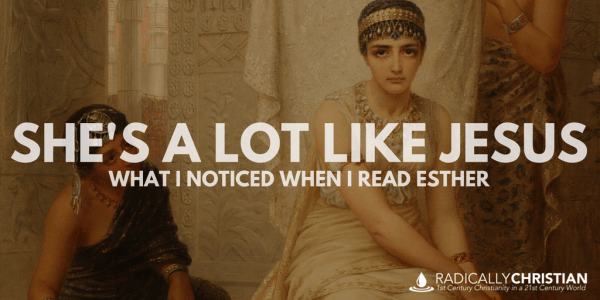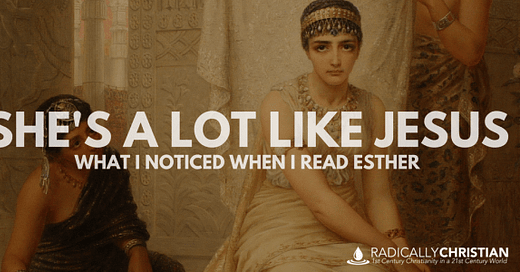She’s A Lot Like Jesus: What I Noticed When I Read Esther
The book of Esther is an amazing story. There is a Jewish holiday that has been celebrated for over 2,500 years, which commemorates the events of this story. But, unfortunately, many of us have a tendency to reduce this story to a moral parable, focusing on just one phrase, “Who knows whether you have not come to the kingdom for such a time as this.” There is so much more to this story than that. Consider these thoughts.

The Setting
The Persian King, Cyrus, had allowed Jews to begin returning to Jerusalem around 538 B.C. The story of Esther takes place more than 50 years after that, but most of the Jews still remain scattered and dispersed all over the Persian Empire. They are vulnerable and unprotected, still exiled all over the world because of their sin.
In the first chapter, we are told King Ahasuerus threw a drunken feast that lasted for nearly six months. Queen Vashti, refused to allow herself to be paraded in front of the drunken guests for their viewing pleasure. So she was deposed.
The king then did an unspeakably horrible thing, though we usually gloss over it. Upon the advice of his counselors, the king rounded up all the beautiful virgins in the Empire and claimed them for his own, adding them to his harem. One by one he robbed each of them of their virginity until he found one he wanted to make his queen. This is the horrible process by which Esther, a beautiful young Jewish girl, found herself to be queen of the Persian Empire.
Esther didn’t ask for this situation. She didn’t apply for a beauty contest. This isn’t a Disney fairytale. This is a situation where a tyrant takes anything he wants from his kingdom, doing whatever he pleases with them, because he believes his subjects are his property.
Winning Favor
A subtle theme that you can pick up in Esther’s story is one which is also found in the stories of Joseph, Daniel, Samuel, and even Jesus. God helped these people gain favor in people’s eyes. They have certain opportunities presented to them and are able to rise to positions of power and leadership because God causes people to look with favor upon them.
Esther is little more than a slave, but she is able to rise to a place of power because God (though he is not named) causes people to look with favor upon her.
Exile Ethic
Another theme in the story of Esther is that of selective disobedience to the Persian government. Mordecai, the man who raised Esther from a child, disobeyed the law when he refused to bow to Haman. His stated reason for this disobedience was simply that he was a Jew.
It isn’t that Mordecai was subversive or rebellious. At one point, he even saved the king’s life from an assassination attempt. But Mordecai made it clear, he is not a Persian. Though he accepted his situation and his role as a subject of Persia, his loyalty was to his own King, not to Persia.
Mordecai, it seems, was still following the instructions of Jeremiah, which had been written to the exiles so long ago. Jeremiah told them to make their homes in exile and seek the welfare of the cities in which they were exiled. To be lights in those communities. But someday God would gather his scattered people back home in the days of the coming Messiah.
Esther was also finally persuaded to break the law, when Mordecai convinced her to intercede on behalf of her people. She was forced to decide whether she would silently try to pass herself off as a Persian, in order to save her own life, or take her rightful place with the Jewish people even though it meant breaking the law by approaching the king in court.
The exile ethic is not to be rebellious or subversive. It is to remember we are not citizens of the kingdoms, nations, and empires in which we live. It is to remember not to give our allegiance to these empires. It is to accept the consequences, even death, for being an unusual people dispersed in the world; a people who do unbelievable good and selfless things, but belong to another kingdom. This is the way 1 Peter teaches Christians to live.
The Primary Theme
With all of that said, I think the primary theme of Esther is this: God will always raise up a deliverer to save his people. Most of the Jews in the story are helpless. The only thing they can do is wear sackcloth and pray. None of them are in positions of authority to stop the coming slaughter of the Jewish people.
The point of the story is not that we are all in a position to do something great. The point of the story is that sometimes we aren’t in a position to do anything at all except pray and trust God. Mordecai believed that even if Esther refused to be the person by whom deliverance came, relief and deliverance would come from somewhere.
God would keep his promises. God would deliver his people. God would raise up someone to be a Moses, a Joshua, a David. In this case, the person God raised up to deliver his people from death was Esther. Consider how this points forward to Jesus:
God raises up a savior.
She gives her life selflessly, on behalf of her people.
Through her willingness to die for others, God’s enemies are defeated and God’s people are given life and honor.
She is vindicated and honored.
Like the Jews of Esther’s day, we are dispersed throughout the world. We are often vulnerable and persecuted because our allegiance is to a kingdom without walls or armies. But we believe God has raised up a deliverer. He has selflessly given himself on our behalf. Through his sacrifice, God’s enemies are being defeated and we will be given life and honor through him.
Trust in the Lord. He always delivers his people. Even from death.
I love you and God loves you,
Wes McAdams
The post She’s A Lot Like Jesus: What I Noticed When I Read Esther appeared first on Radically Christian.




